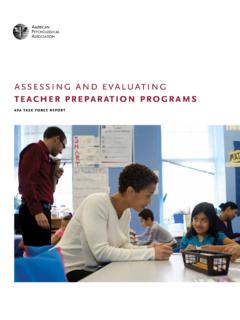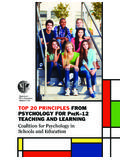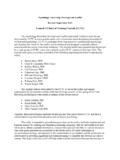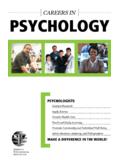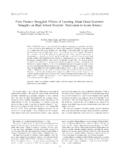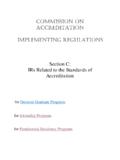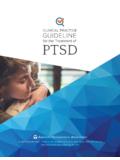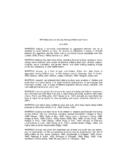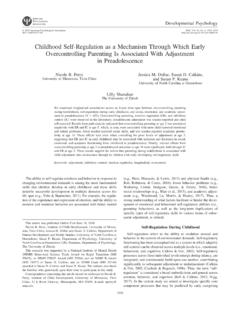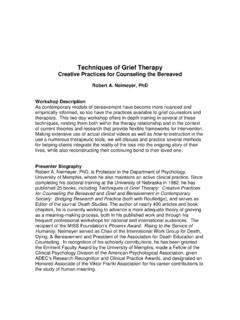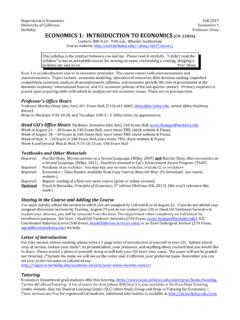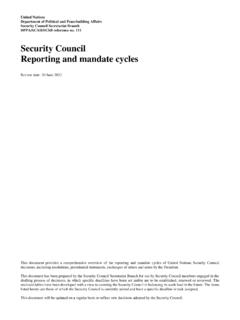Transcription of STRESS IN AMERICA
1 STRESS IN AMERICA GENERATION ZOCTOBER 2018 STRESS IN AMERICA : GENERATION Z 1 The american psychological association (APA) conducted its 12th annual STRESS in AmericaTM survey in August 2018 to understand what causes STRESS in Americans lives and their strategies for coping with STRESS . The Harris Poll conducted the survey online on behalf of APA among 3,458 respondents ages 18+ living in the United States. In addition to the main sample, interviews among teens ages 15 to 17 (n=300) were collected. Gun violence, family separations and high-profile sexual assaults have dominated the news over the past year. With teens and young adults becoming more vocal about these controversies, APA used this year s survey as an opportunity to evaluate the level of STRESS among members of Generation Z. This report provides insight into Gen Z, those between the ages of 15 and 2018 survey results show that high-profile issues, such as sexual harassment and gun violence, are significant stressors for Gen Z.
2 AMERICA s youngest adults are most likely of all generations to report poor mental health, and Gen Z is also significantly more likely to seek professional help for mental health issues. Gun Violence, Immigration, Sexual Harassment Stressing AMERICA s Youngest Adults; Most Likely to Report Poor Mental HealthMEET GEN Z 2 american psychological ASSOCIATIONGEN Zs STRESSED ABOUT SAFETY1 For the purposes of this survey , generations are grouped as follows: Gen Zs (15 21), Millennials (22 39 years old), Gen Xers (40 53 years old), Baby Boomers (54 72 years old) and Matures or older adults (age 73 or older). When Gen Zs is used, it refers to the overall group (ages 15 21), unless otherwise specified ( , Gen Z adults meaning 18-21 or Gen Z teens, 15-17 only). Please note: where descriptions refer to Gen Z adults this means that questions were not asked of the 15-17 age group so no comparative data for that age group a majority of Gen Z youth, gun violence mass shootings and school shootings are significant sources of STRESS .
3 75 percent of those in this age group report mass shootings as a significant source of STRESS , and nearly as many (72 percent) say the same about school shootings or the possibility of them occurring. Around seven in 10 Millennials1 report similar feelings about these events (69 percent about mass shootings and 73 percent about school shootings or the possibility of one occurring). A majority of both Gen Xers and Boomers (58 percent for both) said mass shootings cause STRESS , while around the same numbers of both say the same about school shootings or the possibility they will occur (59 percent of Gen X and 56 percent of Boomers). Though smaller percentages of older adults consider shootings a cause of STRESS , nearly half say that mass shootings (48 percent) and school shootings or the possibility of their occurrence (46 percent) are significant sources of parents report that both mass shootings and school shootings or the possibility of one cause them STRESS .
4 Mass shootings are a significant source of STRESS for nearly seven in 10 parents (69 percent), and school shootings or the possibility of one are a significant source of STRESS for nearly three-quarters of parents (74 percent). More than half of Gen Zs who are in school say they experience STRESS at least sometimes when considering the possibility of a shooting at their school and more than one in five (21 percent) say the possibility of a shooting at their school is a source of STRESS either constantly or often. Security measures taken by schools reduce the STRESS for some, but not most, parents and students. Around one-third (34 percent) of parents who say their child s school has implemented security mea-sures in response to school shootings say this has reduced STRESS significantly or somewhat; nearly the same percentage (30 percent) say such measures have not done anything to alleviate their STRESS .
5 The largest percent (36 percent) say it has actually somewhat or significantly increased the STRESS they feel about school shootings. While slightly more than one in five Gen Z students (22 percent) say security measures in their school have somewhat or signifi-cantly increased their STRESS about school shootings, slightly more than four in 10 (41 percent) say such measures have done nothing for their STRESS . For just more than one-third of students (37 per-cent), security measures have reduced their STRESS significantly or somewhat about school shootings. 56 percent of Gen Zs who are in school say they experience STRESS at least sometimes when considering the possibility of a shooting at their schoolThree in four of Gen Zs report mass shootings as a significant source of STRESS STRESS IN AMERICA : GENERATION Z 3% FEELING STRESSED BY ISSUES IN THE NATIONAL NEWS GEN Zs VS ADULTS OVERALLn GEN Zsn ADULTS OVERALLMass shootingsRise in suicide ratesClimate change and global warmingSeparation and deportation of immigrant and migrant familiesWidespread sexual harassment and assault reportsGEN Zs REPORT MORE STRESS THAN ADULTS OVERALL ABOUT ISSUES IN THE NEWSA number of issues dominate the news cycle today, and for many Gen Z youth these issues are causing them STRESS , often in larger numbers than adults overall.
6 Nearly six in 10 (57 percent) Gen Zs say the separation and depor-tation of immigrant and migrant families is a significant source of STRESS ; less than half of all adults overall (45 percent), on the other hand, consider this a stressor. The difference between Gen Zs and adults overall is evident in their STRESS about widespread sexual harassment and assault reports in the news, with more than half of Gen Z (53 percent) citing these reports as a significant source of STRESS and fewer than four in 10 of adults overall (39 percent) saying the same. STRESSED ABOUT THE NATION, BUT LOWEST INTENTION TO VOTE Many Gen Zs feel STRESS and concern about the nation. Gen Z s reported average STRESS level related to the current state of the nation is (on a scale of 1 to 10, where 1 is little or no STRESS and 10 is a great deal of STRESS ), on par with the national aver-age for adults overall regarding the state of the nation ( ).
7 While Gen Z has featured prominently in the news related to activism around issues affecting the current state of the nation, such as gun control, they are the generation least likely to go to the polls, with just more than half (54 percent) of those ages 18 to 21 saying they intend to vote in the 2018 midterm elec-tions, well below the overall average of seven in 10 adults from all generations. More than half of Gen Z also identify the current political climate as a source of STRESS (55 percent). Around two-thirds of those in this generation also say they feel very or somewhat signifi-cantly stressed about our nation s future (68 percent) and do not believe the nation is moving toward being stronger than ever (66 percent). Despite their STRESS about the present and future concerns for the country, more than seven in 10 Gen Zs (71 percent) report feeling hopeful about their own future.
8 And three in five Gen Zs (60 percent) say they have taken some sort of action in the last year, such as signing a petition or speaking with a friend or family member to persuade them about their political or social 75% 58% 57% 53% 44%62%51%45%39%68 percent of Gen Z adults feel very or somewhat significantly stressed about our nation s future4 american psychological ASSOCIATIONGEN Z MOST LIKELY TO REPORT POOR MENTAL HEALTH AND SEEK HELPGen Z is significantly more likely to report their mental health as fair or poor, with 27 percent saying this is the case. Millennials (15 percent) and Gen Xers (13 percent) have similar numbers reporting fair or poor mental health, while fewer than one in 10 Boomers (7 percent) and older adults (5 percent) consider their mental health fair or Gen Zs are nearly twice as likely as their male peers to report that their mental health is fair or poor (35 percent for female vs.)
9 18 percent for male). When it comes to seeking treatment or therapy, however, the male and female Gen Zs are equally as likely to report they have received or currently receive treatment or therapy from a psychologist or other mental health professional (36 percent for female vs. 38 percent for male).Slightly more than nine in 10 Gen Zs between ages 18 and 21 say they have experienced at least one physical or emotional symptom due to STRESS in the past month, compared to around three-quarters of adults overall who say they have experienced at least one symptom. Among Gen Z adults (ages 18 to 21), common symptoms of STRESS include feeling depressed or sad (58 percent), lack of interest, motivation or energy (55 percent) or feeling nervous or anxious (54 percent). During the prior month, adult Gen Zs also commonly reported laying awake at night due to STRESS (68 percent) or eating too much or eating unhealthy food (58 percent).
10 With public figures sharing mental health challenges and more open discussions in general on this topic, it may be unsurprising that members of Gen Z are more attuned to their own mental health than previous generations. Overall, the younger generations are sig-nificantly more likely to receive or have received treatment or ther-apy from a psychologist or other mental health professional, with more than one-third of both Gen Z (37 percent) and Millennials (35 percent) reporting they have received such help. Around one-quar-ter of Gen Xers (26 percent) say they receive or have received treatment or therapy, and even smaller percentages of Boomers (22 percent) and older adults (15 percent) have gotten assistance from a psychologist or mental health it comes to specific mental health issues, adult Gen Zs are more likely than some other generations to report they have been diagnosed with an anxiety disorder (18 percent) and more likely than all other generations to report they have been diagnosed with depression (23 percent).
